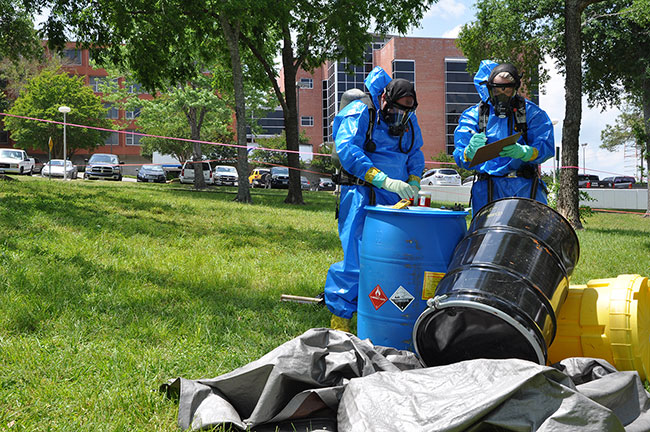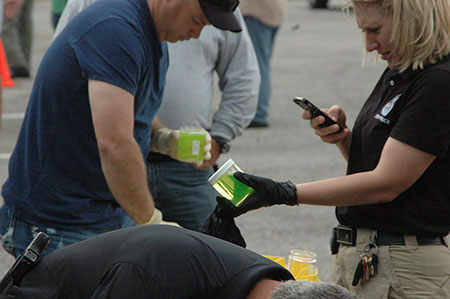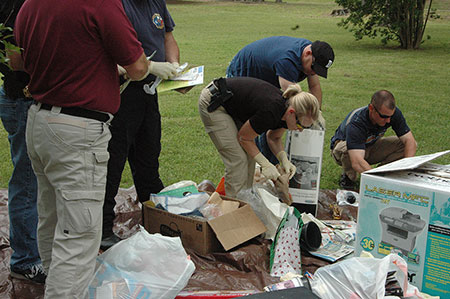New LEMIT Program Investigates Environmental Cases
June 17, 2014
SHSU Media Contact: Beth Kuhles
 |
| Instructors from the Environmental Protection Agency demonstrate how to test dangerous toxic substances during the Bill Blackwood Law Enforcement Institute of Texas's new Environmental Crime Program Training for Environmental Enforcement program. —Photos by Harriet McHale |
For two days, the grounds of Sam Houston State University looked like the scene of an environmental disaster.
Leaking barrels littered the landscape. Mounds of garbage piled up on the pristine lawns. Glowing green liquid flowed into culverts. Men and women in protective suits or gloves picked through the scene, carrying away samples of water, soil and “toxic” materials.
But no need to worry. Newly trained environmental investigators—including law enforcement officers, firefighters, sanitarians and code enforcers—were on hand to contain and investigate the impromptu disasters. They were part of Project EnCRiPT, a new program at the Bill Blackwood Law Enforcement Management Institute of Texas that trains environmental enforcement officers from across the country on how to investigate cases.
“It does raise awareness so they can go back to their agencies and be more prepared,” said Andrea Hoke, program manager for Project EnCriPT, which stands for Environmental Crime Program Training for Environmental Enforcement. “Environmental crime is not something you see a lot about on TV. There are no CSIs or NCISs based on environmental crime.”
The live training was just a part of the new initiative, funded by the United States Environmental Protection Agency, to strengthen civil and criminal enforcement efforts at the local, county, state, and tribal levels. LEMIT also launched free, online courses for working professionals on a wide variety of issues in the field. The project currently offers two online classes on ethics and media relations.
The courses are presented with an innovative approach to learning by combining both visual and auditory aspects. It also delivers some courses as a cohort, which allows colleagues from across the country to take classes together and participate in online discussions and activities.
 |
| (Above) Participants take water samples from a drainage ditch for testing. (Below) Teams learn how to investigate illegal dump sites. |
 |
Future courses will include an “Introduction to Environmental Investigation,” exploring the components of basic environmental investigation recognition and execution; “Illegal Dumping of Non-Hazardous Waste,” defining solid waste, identifying public perceptions, reviewing the components of scene processing, and discussing the documentation process; and “Health and Safety for Environmental Enforcement Inspectors,” involving operational and safety planning, tactics and techniques to mitigate threats and site-specific health and safety plans.
The live training, which is expected to be offered regionally throughout the United States, provides the fundamentals of environmental investigations and offers hands-on training on the skills and equipment needed to ensure public safety and to prepare a strong case for court. It provides practice in documenting, photographing, sketching and mapping scenes; retrieving water and soil samples near streams, in barrels and from underground containers; avoiding cross contamination of samples; and processing solid waste debris and soils.
Among those that participated in the inaugural course were law enforcement, code enforcement and public health officers from throughout the state, including representative from the Abilene Marshal’s Division, Beaumont Police Department, Brazos County Constable Precinct 1, Crockett Environmental Enforcement, Harris County Constable Precinct 5, Harris County Pollution Control Service, Houston Police Department, Huntsville Fire Department, Lower Colorado River Authority, Pasadena Health Department, Montgomery County Constable’s Office, San Jacinto Constable Precinct I, Texas Commission on Environmental Quality, Texas Game Wardens, Walker County Environmental Crime Unit, and West Columbia Police Department.
“(It was a) very good course with great instructors,” said one participant. “(It make me think) how this applies to my line of work on the county level and who I can contact for assistance dealing with environmental issues. (It allow me) to be able to recognize HAZMAT and environmental issues as they pertain to my job.”
In addition to two days in the field, participants received a day in the classroom with lessons on the history of environmental enforcement, hazardous substances and toxicology, officer health and safety, personal protection devices and work practices; detection and monitoring equipment; and proper ways to handle and analyze evidence.
The courses were taught by professional instructors from the EPA, as well as local environmental enforcement officials, who provided examples of investigations they have conducted and the challenges they have faced. The sessions stressed the importance of officer health safety for all involved at the scene. Participants were also exposed to state of the art equipment and techniques that are used by the EPA to investigate the scene, both to protect public safety and to build cases for prosecution or civil action.
For more information about Project EnCRiPT or to register for a course, visit lemitonline.org/environmental/index.html.
- END -
This page maintained by SHSU's Communications Office
Associate Director: Julia May
Manager: Jennifer Gauntt
Located in the 115 Administration Building
Telephone: 936.294.1836; Fax: 936.294.1834
Please send comments, corrections, news tips to Today@Sam.edu.

 SamWeb
SamWeb My Sam
My Sam E-mail
E-mail

